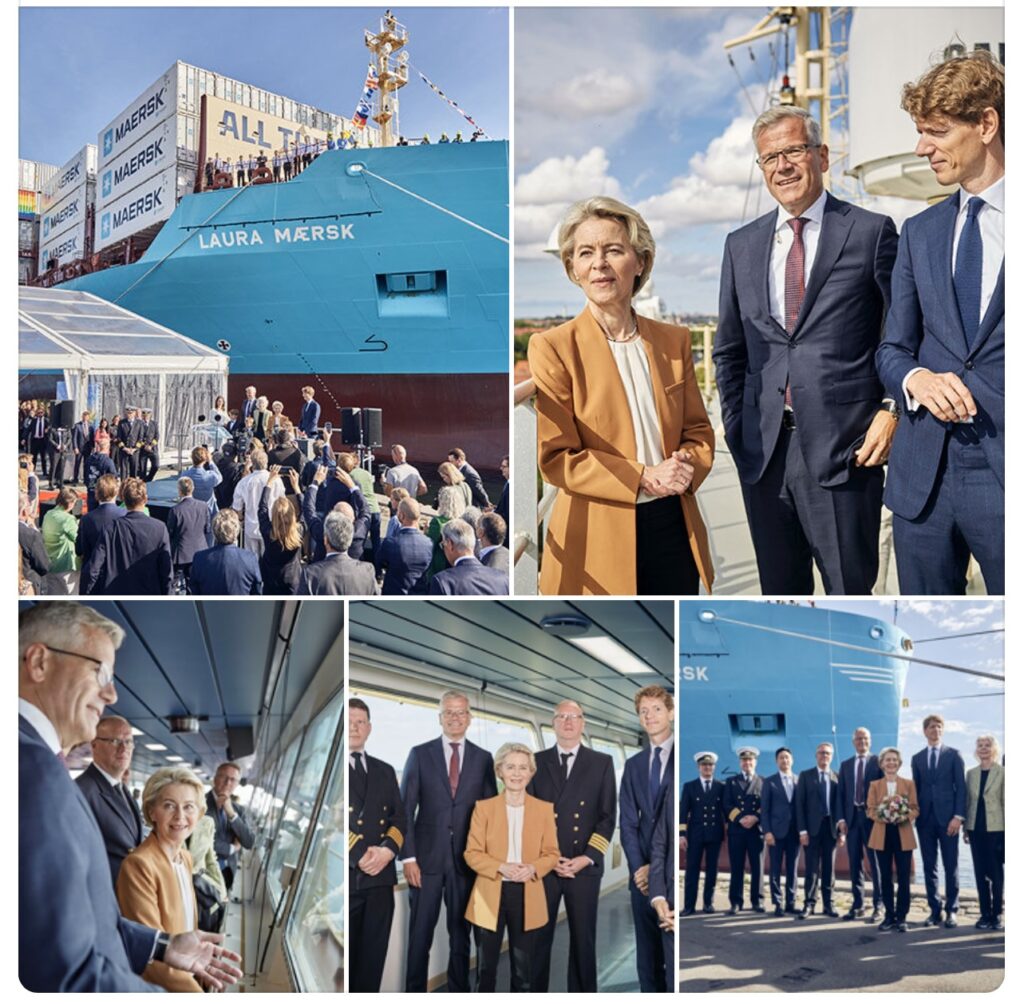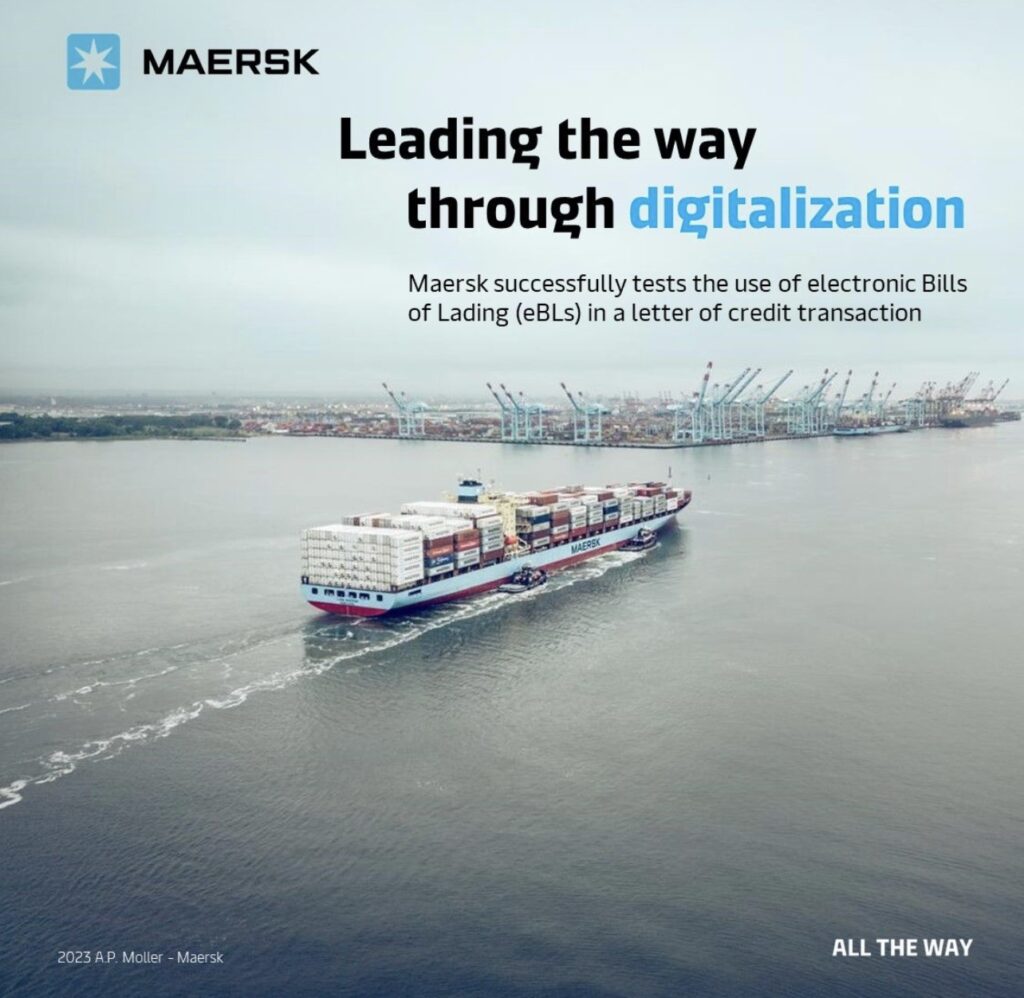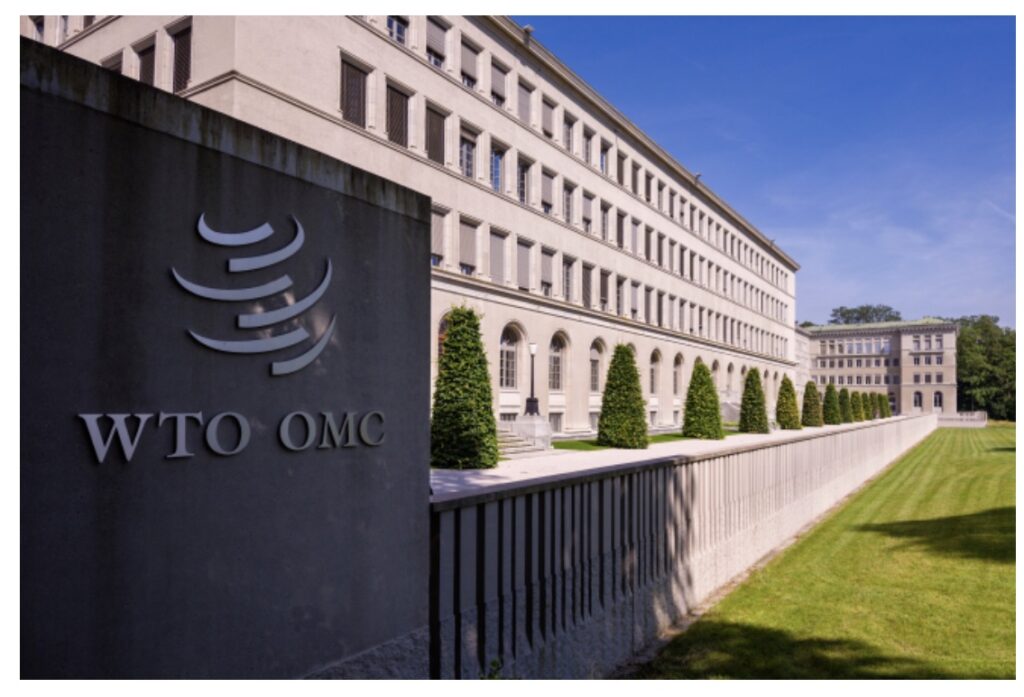The future has a name!
Read the post from our CEO Vincent Clerc below about the naming of our first pioneer, methanol-enabled vessel, creating shipping history – when EU President Ursula von der Leyen gave ’Laura Maersk’ her name.

Vincent Clerc: Today we celebrate the naming of Laura Mærsk our first methanol-enabled vessel marking a special moment in shipping history. Proof of the entrepreneurial spirit that has characterized Maersk since the founding of the company and one that gives me purpose.
Thank you Madame President Ursula von der Leyen for christening our pioneering ship, many partner organisations have collaborated to make this vision a reality. I am so proud of the hard work done by colleagues across Maersk, not least our fantastic crew making this maiden journey. Customers are onboard and investing with us to decarbonize shipping and their supply chains.
Laura Mærsk marks a crucial first step, we have our large ocean-going vessels beginning to enter the fleet in 2024 as we build up momentum in the green transition. But it can’t be done by one company or one country, partnerships are needed.
The announcement of C2X today is a bold move but the right one to scale up the green fuel production the industry so desperately needs. Every day counts when it comes to the urgent task of getting to net zero.
In partnership with IMDA and Ministry of Trade and Industry (Singapore), Maersk has successfully tested the use of interoperable electronic Bills of Lading (eBLs) backed Letter of Credit transactions between Singapore and Indian banks and companies.

The collaboration paves the way for digital cross-border trade, with Minister Gan Kim Yong, “This is a substantial step towards achieving paperless trade, simplifying international transactions, and reducing costs.”
B.V.R. Subrahmanyam, Chief Executive Officer, of NITI Aayog similarly agrees in the milestone’s effectiveness of utilizing blockchain technology for cross-border trade finance.
This underlines Maersk’s continued commitment to adopt 100% eBLs by 2030.
Yesterday (12 September) the WTO’s Public Forum in Geneva began with the launch of its annual World Trade Report.
WTO chief economist, Ralph Ossa, addressed assembled delegates on highlights from the report.
Key talking points were the need to ‘re-globalise’ the world economy amid increasing unilateralism and factionalism, and position international trade as a solution to climate change instead of as one of its causes.

Ossa said: “We need to embrace trade, rather than reject it, if we want to overcome the most pressing challenges of our time.”
He defined ‘re-globalisation’ as “extending trade integration to more economies, to more people and more issues,” and referenced it multiple times during his address.
Recently, nations have been shifting trade through processes like ‘near-shoring’, a result of pandemic disruption, and ‘friend-shoring’ as geopolitical tensions rise in response to Russia’s invasion of Ukraine, as well as China’s fraying relations with the US, India and its Indo-Pacific neighbours.
The report found strong trade growth between countries with similar UN voting patterns, reinforcing a common academic assessment trade is becoming increasingly politicised.
In light of this, the WTO sought to emphasise the case for greater re-globalisation and the benefits of international trade.
One of the crucial reasons for continuing to pursue trade was its ability to lift people out of poverty.
Ossa cited figures that correlated rising international trade with a reduction in the number of people living below the poverty line – US$2.15 per day as defined by the World Bank.
Between 1981 and 2019, the percentage of people in lower- and middle- income countries living below the poverty line fell from 55% to 10%.
Resilience in the face of global supply chain shocks was also cited as a benefit of open economies, an idea evidenced by the differing responses to conflict and disruption of particular nations over the past decade.
Ossa noted that, following the fallout from Russia’s invasion of Ukraine, nations reliant on both countries’ grain supply were able to swiftly source alternative supplies.
The report also seeks to challenge the idea that the trade has is a primary culprit of damage to the environment.
Ossa highlighted that the integral component of international trade – transporting goods to potentially distant export destinations – is not the most polluting element, only contributing a third of the emissions generated by international trade.
The remaining two thirds are derived from the production of goods and the delivery of services. The report argues that trade is instrumental spreading green technology worldwide.
Ossa added that, while trade is often portrayed as part of the problem, “if done right, it can be part of the solution”.
“Just as there are economic gains originating from countries specialising in what they’re relatively good at, there are also environmental gains from trade originating from countries specialising in what they’re green at.”
Ossa’s optimism was questioned by Deborah James, director of the Center for Economic and Policy Research.
She drew attention to the stringent intellectual property rules that hindered vaccine manufacturing in developing countries during the pandemic.
Accused by James of acting as glorified PR for a system designed to “line the pockets of multinationals and rich governments”, Ossa highlighted that the annual report also proposed improvements to the organisation.






You must be logged in to post a comment.